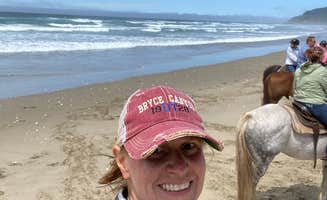Equestrian camping sites near Florence, Oregon offer a distinctive outdoor experience in Oregon's coastal forests. Situated 4-10 miles inland from Highway 101, these specialized campgrounds feature corrals and trail access at elevations between 300-800 feet. Winter temperatures typically range from 40-55°F while summer brings moderate 65-75°F conditions with frequent coastal fog.
What to do
Beach access via horse trails: Navigate the established trails from Baker Beach Campground to reach the shoreline. "Be prepared for a hike through deep shifting sand dunes to get to the beach. And watch out for horse poo as this is a busy horse path the local stable takes to the beach," notes Annie C.
Forest trail riding: Explore the varied terrain surrounding Horse Creek Campground. "The trails are wonderful!! But hilly so make sure your horse is fit or you are willing to take it easy," advises Dodie K. These trails require physically conditioned horses due to the steep coastal forest terrain.
Kayaking on inland waters: Take a break from trail riding with freshwater paddling at Hult Pond. "The pond was great for kayaking and there is plenty to explore if you aren't worried about a little elevation in your hike," shares Nicki G. No motorized boats are permitted, creating a peaceful paddling environment.
What campers like
Privacy between sites: Many horse camps offer good separation between campsites. "The sites are located about 3 miles up a dirt road. There are about ten spots, each with a corral for your horse if you have one. The thick forest of trees make each spot peaceful and private," writes Britany R. about Horse Creek.
Cell service availability: Unlike some remote camping areas, many horse campgrounds maintain connectivity. "Cell service available (att). Not much view and close to other camp sites," reports J R. At Dry Lake Horse Camp, Ash C. mentions it's "close to heceta light house, right before sea lion caves, and close to hikes and away from crowds."
Wilderness experience: The forest setting provides genuine seclusion. "What a fantastic place!!!! We stayed overnight on a lark and it was packed. But the sites are spread apart with lots of natural foliage between as a screen," explains Jill R. This natural screening helps maintain privacy even during busy periods.
What you should know
Limited water availability: Most equestrian campgrounds lack potable water for humans. "This is definitely a dry camp. There's no water so pack in your water," warns Jill R. While some camps have horse water troughs, campers should bring their own drinking water supply.
Road access challenges: Many horse camps have unmarked or difficult access roads. At Near Fawn Creek Campground, limited directional signage means preparation is essential. Ash C. notes about Dry Lake Horse Camp: "The turn into this road from Highway is a sharp one and immediately uphill. Probably not for anyone towing large trailers but if your skilled you can try it out."
Horse-only site competition: Traditional equestrian camps increasingly face pressure from non-horse campers. "If you don't show early in the week with your big rig and all your horses you will not get a spot. It's over run with car camping sucking up all the spots with horse corrals," reports Laurie S.
Tips for camping with families
Pack entertainment options: The remote nature of these campgrounds means limited entertainment. At Hult Pond Recreation Area, Chloe advises: "No service but great from a seclusion! So remember all games and firewood you need!!" This preparation is especially important for keeping children engaged.
Weather preparation: Coastal weather changes quickly, requiring appropriate clothing layers. "It was too rainy and muddy for us to feel like hiking the trails, but they look beautiful," shares Laura M. Even summer evenings can become cool and damp near the coast.
Safety awareness: Be mindful of potential hazards. Jacob P. notes at Hult Pond: "Jagged old logs poke out of the stagnant water as a reminder that someone used to get paid to spend the day here." Keep children supervised around natural and manufactured hazards common in these working forest areas.
Tips from RVers
Limited turnaround space: Horse camps often have challenging parking for larger rigs. At Wild Mare Horse Campground, Bjorn S. observes it's a "cul-de-sac of equestrian charm" with "plenty of room for human and horse at each site." However, this layout can make maneuvering difficult.
Self-contained setup required: Most equestrian sites lack hookups. Laura M. reports about Horse Creek: "Each site has a horse corral, fire pit, and picnic table... There are vault toilets, but no other services. Pack out your own trash please! There is water for horses, but it's not potable for humans."
Early arrival recommended: Competition for level sites means planning ahead. "We went on a Friday and there were alot of people but the sites were spread out nicely you didn't really get bothered by anyone," notes Sean P. Weekdays typically offer better availability than weekends.


